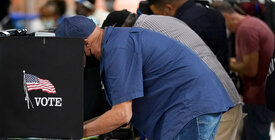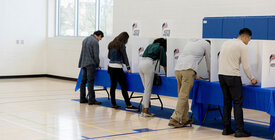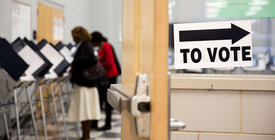Click here for the most recent Voting Laws Roundup >>
In 2024, legislatures across the country once again pushed a significant number of laws to change the rules governing voting. In fact, states enacted more restrictive voting laws in 2024 than in any year in the last decade except for 2021.
Last year again saw a mix of many attacks on and expansions of mail voting. Additionally, there were numerous bills that would require documentary proof of citizenship to vote — often a birth certificate, passport, or naturalization papers. Early indicators for 2025 show that the focus on proof of citizenship is far from dimming, despite voting by noncitizens already being against the law and extremely rare. In fact, legislators in the U.S. House have already reintroduced a bill that would require proof of citizenship in order to register or re-register to vote.
Between January 1 and December 31, 2024:
- At least 10 states enacted 19 restrictive voting laws, including one in North Carolina after the election.1Louisiana alone passed 8 such laws. Overall, lawmakers in at least 40 states considered at least 317 restrictive bills last year.
- At least 3 states enacted 3 election interference laws.2Two passed before the election and North Carolina passed one law after the election in what appeared to be an exceptional partisan maneuver by the legislature. Overall, lawmakers in at least 21 states considered 63 election interference bills last year.
- At least 21 states enacted 32 expansive voting laws,34 of which were enacted after our September 2024 roundup. Overall, lawmakers in at least 44 states and Washington, DC, considered at least 648 expansive voting bills last year.4
Between 2021 and 2024, states passed a total of 79 restrictive voting laws, a significantly higher total compared with similar stretches over the previous decade. This represents nearly three times the number of restrictive laws passed between 2017 and 2020 (27), and more than four times the total between 2013 and 2016 (17).
Endnotes
-
1
Legislation is categorized as restrictive if it contains one or more provisions that would make it harder for eligible Americans to register, stay on the voter rolls, or vote compared to existing state law.
-
2
Legislation is categorized as election interference if it either threatens the people and processes that make elections work or increases opportunities for partisan interference in election results or administration.
-
3
Legislation is categorized as expansive if it contains one or more provisions that would make it easier for eligible Americans to register, stay on the voter rolls, or vote compared to existing state law.
-
4
Only 46 states and Washington, DC, had legislative sessions this year, meaning the only 2 states not to introduce an expansive voting bill that were able to were Arkansas and Maine.



